Gaza Beach Murder Eyewitness; Demonstration in Tel Aviv Saturday; On Collective Punishment
- Witness to a Shelling: First-hand Account of Deadly Strike on Gaza Port - Peter Beaumont in Gaza (The Guardian (UK))
- Stop the Killing and Destruction! Cease the Fire, Lift the Siege, Move Towards Peace! - Adam Keller (Gush-Shalom)
- Israel Inflicts Illegal Collective Punishment on Gaza - Marjorie Cohn (Truthout)
Witness to a Shelling: First-hand Account of Deadly Strike on Gaza Port
There is a deafening explosion, then a second. Four children are dead. Four survivors reach the safety of our hotel
By Peter Beaumont in Gaza
July 16, 2014
The first projectile hit the sea wall of Gaza City's little harbour just after four o'clock. As the smoke from the explosion thinned, four figures could be seen running, ragged silhouettes, legs pumping furiously along the wall. Even from a distance of 200 metres, it was obvious that three of them were children.
Jumping off the harbour wall, they turned on to the beach, attempting to cross the short distance to the safety of the Al-Deira hotel, base for many of the journalists covering the Gaza conflict.
They waved and shouted at the watching journalists as they passed a little collection of brightly coloured beach tents, used by bathers in peacetime.
Link to video: Gaza: Israeli strike kills four children on beach
It was there that the second shell hit the beach, those firing apparently adjusting their fire to target the fleeing survivors. As it exploded, journalists standing by the terrace wall shouted: "They are only children."
In the space of 40 seconds, four boys who had been playing hide and seek among fishermen's shacks on the wall were dead. They were aged between seven and 11; two were named Mohammad, one Zakaria and the youngest Ahed. All were members of the extended Bakr family.
Three others who were injured made it to the hotel: Hamad Bakr, aged 13, with shrapnel in his chest; his cousin Motasem, 11, injured in his head and legs, and Mohammad Abu Watfah, 21, who was hit by shrapnel in his stomach.
A man who had been near them reached the hotel terrace first, scrambling up a steep sandy bank. A skinny man in his 30s, he groaned and held up a T-shirt already staining red with blood where he was hit in the stomach. He fainted and was carried to a taxi waved down in the street as he grew pale and limp.
The children were brought up next. Pulling up the T-shirt of the first boy, journalists administering first aid found a shrapnel hole, small and round as a pencil head, where he had been hit in the chest. Another boy, a brother or cousin, who was uninjured, slumped by the wall, weeping.
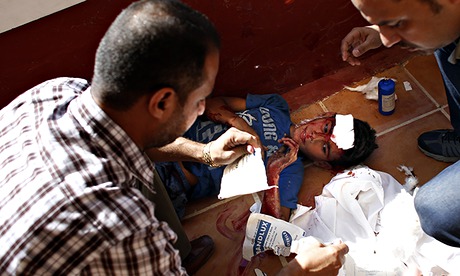
Employees of Gaza City's al-Deira hotel take care of a wounded boy.
Photograph: Thomas Coex/AFP/Getty Images // The Guardian
The injured boy cried in pain as the journalists cleaned and dressed the wound, wrapping a field dressing around his chest. He winced in pain, clearly embarrassed too as a colleague checked his shorts to look for unseen femoral bleeding. A waiter grabbed a table cloth to use as a stretcher, but a photographer took the boy in his arms to carry him to the ambulance.
The Israeli military said it was looking into the incident. The Israel Defence Force told the AFP in a statement: "Based on preliminary results, the target of this strike was Hamas terrorist operatives. The reported civilian casualties from this strike are a tragic outcome."
The Islamist group Hamas, which controls Gaza, on Wednesday formally rejected Egypt's ceasefire proposal that had been accepted by Israel to end the nine-day-old conflict that has left at least 213 Palestinians and one Israeli dead. In a text message to the Associated Press, a senior Hamas figure, Sami Abu Zuhri, said: "We informed Cairo today officially that we don't accept the proposal they made."
He added that Hamas felt "alone in the field" with little support from the Arab world and called on the Palestinian president, Mahmoud Abbas, of the rival Fatah faction in the West Bank, to support Hamas's refusal of the ceasefire deal.
Diplomatic sources told the Guardian that they did not believe that a serious new ceasefire proposal was likely to emerge for several days and, even then, securing a deal looked very difficult.
Hamas's rejection came as an Israeli official said Israel's defence minister had asked prime minister Binyamin Netanyahu's security cabinet to authorise the mobilisation of another 8,000 reserves. The military has said about 30,000 reservists have been called up since the Israeli offensive began last week.
Israeli experts have been predicting in recent days that any ground attack, which Israel has threatened, may involve overland raids in the Gaza Strip to destroy command bunkers and tunnels that have allowed the outgunned Palestinians to withstand air and naval barrages and keep the rockets flying. Hamas continued to fire dozens of rockets into Israel on Wednesday.
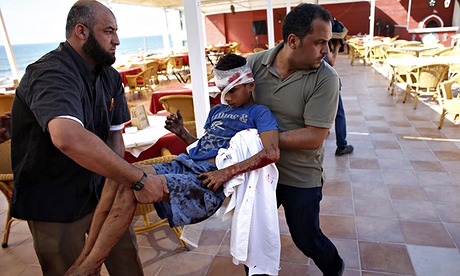
Palestinian employees of Gaza City's al-Deira hotel carry a wounded boy following the shelling nearby on the beach.
Photograph: Thomas Coex/AFP/Getty Images // The Guardian
Hamas views a significant easing of the Israeli blockade as key to its survival, but does not believe Egypt's current rulers - who deposed a Hamas-friendly government in Cairo last year - can be fair brokers.
The Egyptian proposal called for a halt in hostilities by Tuesday night to be followed by talks on the terms of a longer-term ceasefire, including easing Gaza's seven-year-old border blockade by Israel and Egypt. Israeli air raids on Gaza on Wednesday saw the targeting of 30 houses, including those of senior Hamas leaders, most notably Mahmoud Zahar, Hamas's former foreign minister.
Alongside the air strikes, Israel told tens of thousands of residents of the northern town of Beit Lahiya and the Zeitoun and Shujai'iya neighbourhoods of Gaza City- all near the Israel border - to evacuate their homes by 8am. The warnings came by automated phonecalls, texts and leaflets dropped from planes.
The Israeli military said in its message that large numbers of rockets were being launched from these areas and that Israel planned to bomb these locations.
"Whoever disregards these instructions and fails to evacuate immediately endangers their own lives, as well as those of their families," the message said.
At the Shifa hospital on Wednesday afternoon, Hamad Bakr was conscious and waiting for surgery to remove the shrapnel from his chest and drain fluid from his chest cavity. "My father has a fishing boat there. We were playing hide and seek when we were hit. I didn't hear the first one which killed one of us but I heard the second as we were running along the beach. That one killed three more."
His mother Taghrid, 35, came into the room. "Why did you go out of the door?" she demanded of Hamad.
She said that his brother, Younis, who was with Hamad, while he was being treated, "is so scared that he is shaking".
Suddenly angry and grief stricken, she said: "They killed my nephew. Who does that? Who fires on children?"
As the reporters left, Mohammad Abu Watfah was wheeled out of a lift after surgery to remove the shrapnel in his stomach. As relatives gathered not far from the Al-Deira hotel to bury the four dead boys, barely 90 minutes after the attack on the beach, the boys' uncle, Abdel Kareem Baker, 41, said: "It's a cold-blooded massacre. It's a shame they didn't identify them as kids with all of the advanced technology they claim they're using."
[Peter Beaumont is the Guardian's Jerusalem correspondent. He has reported extensively from conflict zones including Africa, the Balkans and the Middle East, and has reported widely on human rights issues and the impact of conflict on civilians. The winner of the George Orwell Prize for his reports from Iraq, he is the author of The Secret Life of War: Journeys Through Modern Conflict.]
Stop the Killing and Destruction! Cease the Fire, Lift the Siege, Move Towards Peace!
Adam Keller
July 17, 2014
Gush-Shalom
Demonstration
Saturday, July 19, 2014 at 8:00 pm
Habima Square, Tel Aviv
Stop the killing and destruction! Cease the fire, lift the siege, move towards peace!
It is forbidden to shoot at civilian populations. It is forbidden and still it happens. Both sides do it. Hamas shoots on the population of Israel. The IDF shoots at the population of Gaza.
Two equal sides? Far from it. The State of Israel has enormous military and economic strength. With massive financial assistance from the United States, the State of Israel built the "Iron Dome" system, a great technological achievement which protects us. Therefore, the missile attacks on Israeli cities are mostly a nuisance. The air raid alarms are irritating, a bit disruptive to the routine of life, sometimes frightening - but not much more.
Gazans have no Iron Dome, no protection whatsoever against the death which falls down on them from the air and the sea and the land. The State of Israel is pounding Gaza, killing and killing and killing. True - The State of Israel has no premeditated purpose of killing innocent civilians, women and men and the elderly and children playing football on the beach. There is no premeditated purpose - but there is a reality. The killing of unarmed civilians in Gaza is going on, day by day and hour by hour. More than two hundred Palestinians have been killed. A large part of them were unarmed civilians, dozens of them were children. And it goes on.
"Why are they shooting at us?" Wondered righteously the outgoing President of Israel, Nobel Peace Prize Laureate. "Why did they not make of Gaza a flourishing Singapore?". But Shimon Peres forgot to mention that the city state of Singapore, whose population and size are comparable to those of the Gaza Strip, has one of the largest ports in the world. There is no one to block thousands of ships from all over world sailing in and out of that port, maintain the flow of trade on which the wealth of Singapore is built. The minuscule port of Gaza is closed and blockaded. The Israeli Navy is ever vigilant to prevent even the smallest vessels from reaching it, and shoots at Gazan fishing boats which venture more than a few kilometers from shore.
Gaza is a big prison for its residents, nearly two millions of them. The State of Israel and its neighbor Egypt - with whom relationship has tightened considerably since General Sisi seized power - cooperate in imposing the siege on Gaza and holding its population effectively incarcerated, unable to come and go to the outside world. Gazas live on a seashore. They can swim and play on the beach (on days where lethal shots don't come at them out of the sea). But they can't get on a boat and sail into the sea, nor on a plane flying to any destination anywhere in the world. Also the land crossings are almost completely closed. For years, millions of people are locked up in the little, narrow and extremely crowded piece of land called the Gaza Strip.
"We imposed a siege on them because they are shooting at us," say the leaders of Israel. (By the way, the siege on Gaza began long before Hamas took power there). "We shoot because you impose a siege on us. We will not agree to a cease-fire which does not include the lifting of the siege," say Gaza residents this week (not all of them Hamas members).
There is no point to a ceasefire which would simply restore the situation that existed two weeks ago. The situation of two weeks ago was unbearable - a situation of a tight siege over the Gaza Strip, causing suffering and economic suffocation and extreme poverty for the majority of its inhabitants. The siege of Gaza has spawned several rounds of conflict. Continuation of the siege is a sure recipe for another round in a year or two.
Only the lifting of the siege on Gaza, enabling its residents to come and go by land and sea and air, export and import goods and develop their economy, can open up for them a hope for the future. Only the lifting of the siege can give a chance for peace and quiet on Israel's border with the Gaza Strip.
On Saturday night Gush Shalom will join with peace and human rights organizations in a protest against the cruel and unnecessary war called "Operation Protective Edge". Last week, an earlier demonstration on the same location was attacked by extreme right thugs. Organizers of the current protest have taken precautions to make sure this is not repeated - and of course, what happened will not deter us from expressing our position on an issue vital to our future.
As we were informed, demonstration marshals and stewards will be present on the spot, and anyone intending to come should follow their instructions regarding location, conduct of the demonstration and its dispersal, and refrain from taking any violent action from our side.
Stop the killing and destruction!
Cease the fire, lift the siege, move towards peace!
Demonstration Saturday, July 19, 2014 at 8:00 pm
Habima Square, Tel Aviv
Israel Inflicts Illegal Collective Punishment on Gaza
By Marjorie Cohn, Truthout News Analysis
July 14, 2014
Truthout
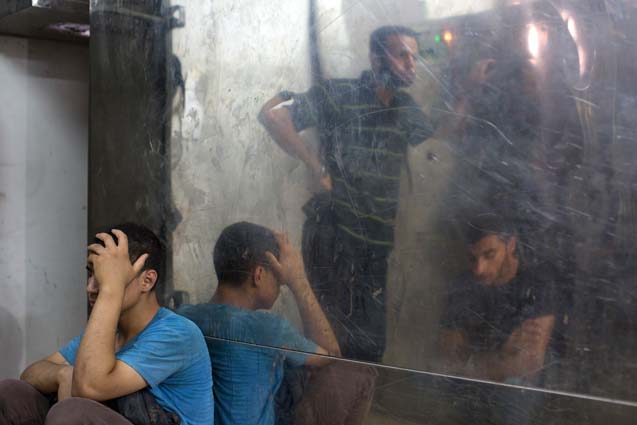
Mourners at a morgue after an overnight Israeli air strike in Gaza City, July 13, 2014.
Photo: Tyler Hicks/The New York Times // Truthout
Israel has commenced full-scale warfare on the people of Gaza. The recent tensions began about six weeks ago when Israeli forces abducted 17 Palestinian teenage boys in the occupied West Bank. Then, on June 12, three Israeli teenagers were abducted in the southern West Bank; Israel blamed Hamas. After the three youths were found dead, a group of Israelis tortured and killed a Palestinian teenager in Jerusalem. Finally, on July 7, Israel launched a large military operation dubbed "Operation Protective Edge" in the Gaza Strip.
During the past week, Israel has killed 162 Palestinian civilians and counting, including 34 children. In addition to more than 1,200 Israeli airstrikes, Israel has threatened to launch a ground invasion of Gaza. Israel attacked a center for the mentally and physically disabled in Beit Zahiya, killing three patients and a nurse. In addition, Israel has stepped up demolitions of Palestinian homes, and administrative detentions of Palestinians without charge or trial.
The UN Office for the Coordination of Humanitarian Affairs(OCHA) reported that 77 percent of the people Israel has killed in Gaza were civilians. Although Hamas has launched about 1,000 rockets into Israel in the past week, no Israelis have been killed. [Moderator's Note: When this was written and originally posted, there were no Israeli deaths; as of last night there was one.]
UN High Commissioner for Human Rights Navi Pillay expressed alarm at the Israeli military operations as well as the indiscriminate firing of rockets from Gaza into Israel. "For its part, the Government of Israel must take all possible measures to ensure full respect for the principles of distinction, proportionality and precautions in attack, during the conduct of hostilities, as required by international humanitarian law. In all circumstances, they must avoid targeting civilians," she said. In light of "deeply disturbing reports that many of the civilian casualties, including of children, occurred as a result of strikes on homes," Pillay continued, "serious doubt [has been raised] about whether the Israeli strikes have been in accordance with international humanitarian law and international human rights law."
The principle of distinction forbids deliberate attacks on civilians or civilian objects. The proportionality principle forbids disproportionate and excessive civilian casualties compared to the claimed military advantage gained in the attack. Precaution requires that measures be taken in advance to ensure compliance with the principles of distinction and proportionality, to minimize incidental loss of civilian life, injury to civilians and damage to civilian objects, and requires taking all feasible precautions in the choice of means and methods of warfare.
Collective Punishment by Israel
Headlines in the mainstream media falsely portray an equivalence of firepower between Israelis and Palestinians in Gaza. But Israel's use of force greatly exceeds that of the Palestinians, and the asymmetric warfare continues to escalate. The Obama administration and Congress have condemned the rocket fire into Israel by Hamas and the "deliberate targeting of civilians." But Washington says Israel has a right to defend itself, justifying Israel's bombing campaign in Gaza and blaming Hamas, while minimizing Israel's role in creating and escalating the violence.
Israel's overwhelming use of military force constitutes collective punishment, which is a war crime. The laws of war, also known as international humanitarian law, are primarily found in the Geneva Conventions. Article 33 of the Fourth Geneva Convention, to which Israel is a party, specifically forbids collective punishment. It says, "No protected person may be punished for an offense he or she has not personally committed . . . Reprisals against protected persons and their property are prohibited."
Israel's collective punishment of Palestinians in Operation Protective Edge constitutes a deliberate policy to punish the entire population of Gaza. Since the Palestinians concluded a unity agreement between Fatah in the West Bank and Hamas in Gaza in June, Israel has stepped up the construction of illegal Israeli settlements in the West Bank and Jerusalem. Richard Falk, former UN Special Rapporteur on the situation of human rights in the Palestinian territories occupied by Israel since 1967, noted that Israel broke off the peace talks with the Palestinians before the formation of the Palestinian unity agreement.
Israeli Prime Minister Benjamin Netanyahu has blamed Hamas for the kidnapping and killing of the three Israeli teens in order to discredit the new Palestinian unity agreement. In what amounts to a catch-22, Netanyahu has cynically stymied the peace negotiations because, he said, there was no unified voice to speak for the Palestinians. But now that the Palestinians have a unity agreement, Netanyahu is driving a wedge between Fatah and Hamas in an effort to justify and maintain Israel's occupation of Palestinian territory.
The 140 square-mile Gaza Strip, home to 1.7 million people (half of whom are children), is one of the most densely populated areas in the world. It is often described as the world's largest "open air prison," as Israel maintains a tight blockade, restricting all ingress and egress. Since mid-2013, unemployment has dramatically increased and delivery of basic services has decreased. More than 90 percent of the water in Gaza is unsuitable for drinking. The health system is close to collapse, according to the World Health Organization. Last year, the UN Committee on the Rights of the Child reported, "Palestinian children arrested by military and police are systematically subject to degrading treatment, and often to acts of torture." The committee also concluded that Israel's "illegal long-standing occupation" of Palestinian land, continued expansion of "unlawful" Jewish settlements, construction of the barrier wall into the West Bank [found by the International Court of Justice 10 years ago to violate international law], and the confiscation of land and demolition of homes and livelihoods "constitute severe and continuous violations of the rights of Palestinian children and their families."
After Israel's 2008 to 2009 Operation Cast Lead, in which nearly 1,400 Palestinians (82 percent of whom were civilians) and 13 Israelis were killed, a UN Human Rights Council report by a commission headed by Justice Richard Goldstone concluded, "Disproportionate destruction and violence against civilians were part of a deliberate policy [by Israel]."
In its 2009 report, the Public Committee Against Torture in Israel (PCATI) found, "During Operation Cast Lead no type of property was left untouched: residences, hospitals, schools, mosques, factories and agricultural fields were demolished by the IDF."
Israel, according to PCATI, employed "a coherent strategy that incorporated two major elements into the planning of Operation Cast Lead: 1) The implementation of the 'Dahiye Doctrine,' the principal tenet of which was to cause intentional suffering to civilians so that they would bring pressure to bear on those who were fighting against the IDF [Israel Defense Forces], and 2) The 'No Risk' policy, which placed absolute priority on preventing harm to IDF soldiers, even at the cost of greater danger to Palestinian civilians." Israel is apparently pursuing the same policy in Operation Protective Edge.
In 2013, Falk said, "the people of Gaza have endured the unendurable and suffered what is insufferable for six years. Israel's collective punishment of the civilian population in Gaza must end today." He added, "Israel has the responsibility as the Occupying Power to protect the civilian population."
"In circumstances of prolonged occupation and state terrorism," Falk observed, "Hamas is entitled to claim rights of resistance, although their precise contours are not clearly established by international law. Hamas is certainly entitled to act in self-defense within the constraints of international humanitarian law."
International Reaction
On July 12, 2014, the UN Security Council issued a unanimous statement calling for an immediate ceasefire and "de-escalation of the situation, restoration of calm, and reinstitution of the November 2012 ceasefire." That ceasefire ended eight days of bombings of Gaza by Israel that killed 140 Palestinians, and rocket attacks by Hamas along the border that killed five Israelis. In its July 12 statement, the Council expressed "serious concern regarding the crisis related to Gaza and the protection and welfare of civilians on both sides" and called for respect for international humanitarian law, including the protection of civilians.
Hanna Amira, a member of the executive committee of the Palestine Liberation Organization in the West Bank, said of the Council's statement, "This announcement deals with the oppressor and the victim in the same way; it is a general call to end the fighting, without setting any mechanism to end the fighting. What is needed is an end to the aggression against the Palestinian people in Gaza."
The Palestinian Boycott, Divestment and Sanctions (BDS) National Committee has called on "international governments to impose a two-way arms embargo immediately and to suspend bilateral agreements until Israel fully complies with international law." Indeed, US military aid to Israel also violates US law. The Human Rights and Security Assistance Act requires that the United States halt all military aid to Israel because the latter has engaged in a consistent pattern of gross violation of internationally recognized human rights.
"Because collective punishment is a war crime under the Geneva Conventions, [the Palestinian BDS National Committee] urge the international community to pressure Israel to end its all-out military assault aimed against the total population of Gaza, open the Rafah crossing [between Egypt and Gaza] permanently and heed our call for boycotts, divestment and sanctions." Organizations such as the Bill Gates Foundation, the Presbyterian Church USA and the United Methodist Church are divesting from companies that profit from Israel's occupation, including Hewlett Packard, Motorola Solutions and Caterpillar.
"Israel is able to act with utter impunity because of the military, economic and political support it receives from governments around the world," according to Zaid Shuaibi, a spokesperson for the Palestinian BDS National Committee. Indeed, Israel would be unable to carry out its policies of aggression in Gaza without the support of the United States, which gives Israel more than $3 billion per year.
The United States should demand an immediate ceasefire from both Israel and Hamas. The US government should condemn Israel's escalation, bombing and collective punishment of civilians just as forcefully as it has condemned Hamas' firing of rockets. The Gaza blockade and limitations on freedom of travel of Gazans should be lifted and Israel's occupation of the Palestinian territories should be ended.
[Marjorie Cohn is a professor at Thomas Jefferson School of Law, a former president of the National Lawyers Guild, and deputy secretary general of the International Association of Democratic Lawyers. Her books include Cowboy Republic: Six Ways the Bush Gang Has Defied the Law. Her next book, Drones and Targeted Killing: Legal, Moral and Geopolitical Issues, will be published this fall.]
Thanks to the author for sending this to Portside.
Copyright, Truthout. Reprinted with permission. May not be reprinted without permission.

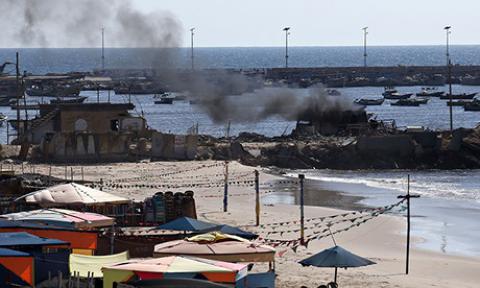
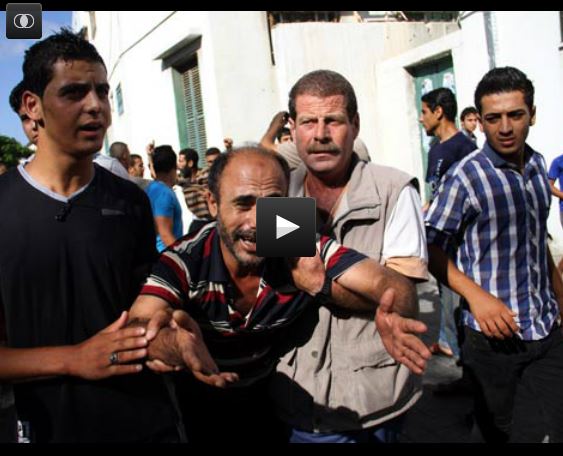
Spread the word